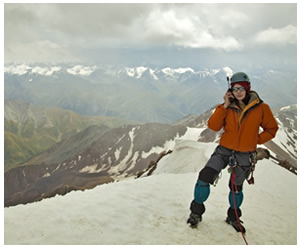The 5 Most Common Users of Satellite Phones
 The satellite phone is one of the most useful tools one will ever buy, but many people neglect to make this fateful purchase simply because they don’t see the use. After all, everyone today owns a cellphone, and providers offer global service so users can find reception no matter where they travel. Unless, that is, one’s cell phone isn’t outfitted with the technology to utilize a foreign country’s towers, or one desires to explore a region beyond the bounds of civilization. In fact, there are a hundred or more scenarios where a traditional cellphone is as useful as a potato in keeping in touch with the outside world.
The satellite phone is one of the most useful tools one will ever buy, but many people neglect to make this fateful purchase simply because they don’t see the use. After all, everyone today owns a cellphone, and providers offer global service so users can find reception no matter where they travel. Unless, that is, one’s cell phone isn’t outfitted with the technology to utilize a foreign country’s towers, or one desires to explore a region beyond the bounds of civilization. In fact, there are a hundred or more scenarios where a traditional cellphone is as useful as a potato in keeping in touch with the outside world.
More people profit from the ability to constantly and unfailingly communicate than one might think. To educate those on the myriad advantages of owning a sat phone, here’s a list of people and occupations that use the tech most often.
1. Intrepid Travelers
Everyone catches the travel bug every once in a while; we get the inescapable urge to jump on a plane and fly to unexplored regions to experience unseen sights and unfelt cultures. Yet, those who are particularly prone to wanderlust know that rash action does not benefit the traveler.
Frequent travelers have a dedicated stash of crucial travel tools necessary for any trip, and inevitably included in their tool bag is the incredibly useful satellite phone. Though vacations often don’t happen without a thoroughly planned itinerary, an experienced traveler knows that trips to foreign, and even some domestic, lands are unpredictable at best, so it is safest and smartest to carry along an assured means of communication.
2. Business People
In the modern global economy, more and more people in the business sector are traveling far and wide to chase down leads and convert them into sales. Performing business overseas is delicate and complicated due to language barriers and culture differences, but it becomes downright difficult when one realizes the need for constant communication with the home office. Some countries lack the ubiquitous Internet and cellphone service of the United States, so the satellite phone’s constant, reliable connectivity is a major boon for business.
3. Journalists
Much the same as business people, journalists must follow stories to the ends of the Earth, meaning they often find themselves in remote regions without hope for Wi-Fi to submit their drafts. Nowadays, a handful of satellite phones, like the Globalstar Sat-Fi, come equipped with Internet service to allow downloading and uploading from anywhere on the planet.
However, contrary to business travelers, journalists tend to become swept up in turmoil, and their immediate physical safety can become threatened quickly. Journalists gain the most from the satellite phone’s ability to connect its users with emergency services, so they can feel secure with their reporting despite the potential danger of a story.
4. Scientists
 In the popular imagination, scientists are glasses-wearing geeks with rubber gloves and pipettes who hole up in their labs for weeks on end until their fated “Eureka!” moment occurs. However, this couldn’t be farther from the truth. Most scientists enter the profession for its promise of travel and discovery. The world is full of unexplained phenomena, and scientists pursue understanding to the corners of the map. In fact, the most far-off and inaccessible regions are the ones most likely to catch a scientist’s eye.
In the popular imagination, scientists are glasses-wearing geeks with rubber gloves and pipettes who hole up in their labs for weeks on end until their fated “Eureka!” moment occurs. However, this couldn’t be farther from the truth. Most scientists enter the profession for its promise of travel and discovery. The world is full of unexplained phenomena, and scientists pursue understanding to the corners of the map. In fact, the most far-off and inaccessible regions are the ones most likely to catch a scientist’s eye.
Deep in the Amazon Rainforest or high up the Antarctic mountains, scientists set up makeshift laboratories to study the mysteries of the world. Though the isolation is key to their investigations, scientists still require contact with civilization, whether it be for another shipment of supplies or to announce their Earth-shattering breakthrough. Thus, sat phones with satellite Internet options are highly sought after. Plus, science often presents more danger than one expects, and the added security of a satellite phone is a relief.
5. Survivalists
We all know the Earth’s days are numbered, but most people hope that number extends long after their lifetime. Survivalists do not count among “most people.” This distinct group is diligently preparing for the much-anticipated apocalypse, when civilization as we know it will come crashing down, and humans will be left to scramble for supplies to survive on the new Earth. Survivalists stock up on nonperishable foods, build impenetrable shelters, and procure trustworthy tools to keep them alive for decades longer than their peers.
Most survivalists believe in a version of the future where electricity and other modern conveniences will no longer function properly. Thus, cell phone towers and landlines will not be able to provide the ever-present communication they once did, even in what once were fully developed nations. Conversely, satellites will be largely unaffected by any Earth-bound catastrophes, so satellite phones should continue to function well into the future. It is never unwise to be prepared, and survivalists are ready for any scenario.
Vastly different groups of people seek out the assured connection of a satellite phone. Whether an overseas traveler wants to hear a familiar voice or a scientist needs more provisions for a promising discovery, a satellite phone can always deliver clear and constant service.
